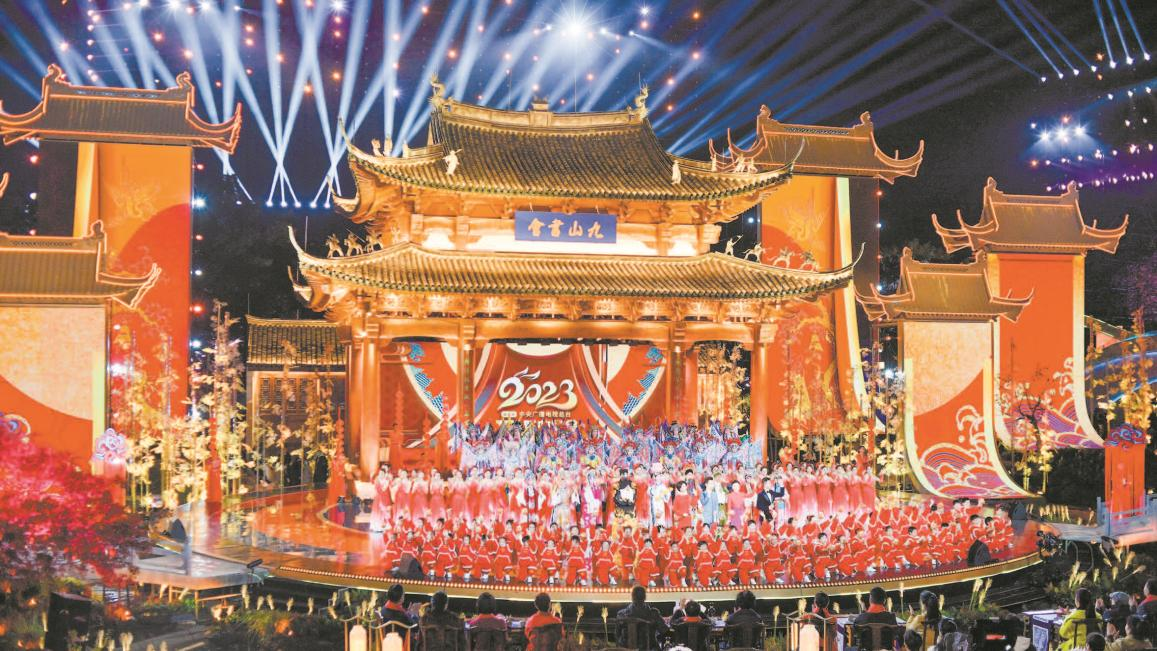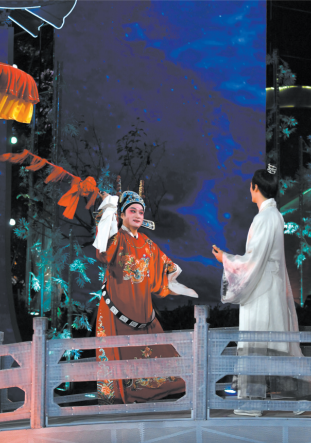Wenzhou steals the show by its opera
時間:2023-02-08 16:30:23 來源 : DiscoverWenzhou 作者 : ZhongXin


On the evening of the first day of the Lunar New Year, CCTV’s“2023 Spring Festival Opera Gala” was broadcast as scheduled, offering a special and splendid cultural feast to audiences nationwide. This is the first time in the 33 years since the Spring Festival Opera Gala was launched that the main venue has been moved outdoors from the studio to Jiushan Shuhui, a public culture space with an ancient stage, the original site of Jiushan Association of Dramatists established in the Southern Song Dynasty (1127-1279). While tracing the hometown of Nanxi Opera, the gala also gave a glimpse of the origin of Nanxi Opera and its connection with the city. Over the past few days, the gala has been well received and got sterling reputation. As of January 24, its cumulative exposure on all platforms across the network reached 3 billion times, becoming the trending search of over 32 platforms across the network. Its video was played over 10 million times while there were more than 200 million reads of the topic on Weibo, among which the reads of“2023 CCTV Spring Festival Opera Gala” exceeded 85 million. Then how did this Spring Festival Opera Gala steal the show and go viral? Finding the roots through opera in the face of modern life With the original intention of tracing the origin of opera and implementing the craftsmanship, the gala traced the history and presented both history and opera to the audience. Wenzhou, as the birthplace of Nanxi Opera, has set the pattern and paradigm for Chinese opera, the first of its kind. By locating in Wenzhou, the gala has pioneered a new format and paradigm for watching the opera in the New Year, becoming a trendsetter as well. The recording venue, Jiushan Shuhui, was transformed into a live-action stage with a blend of landscape and choreography that drew on traditional Song Dynasty (960-1279) architecture. 12 theaters in the venue staged dozens of plays, while AR technology achieved the combination of the immersive stage and the landscape, bringing the audience one good show after another. Set against the backdrop of Wenzhou’s landscape, the digital space art was integrated into the real scenery to recreate the Jiushan Association of Dramatists in the Song Dynasty, the origin of Nanxi Opera. Plays on the 360-degree panoramic immersive circular stage took the audience back to the ancient operatic circle. While contributing to a better quality and connotation of the Spring Festival Opera Gala via its rich legacy, the birthplace of Nanxi Opera was also paraded before audience nationwide through the gala. Created at the Jiushan Association of Dramatists, The Number One Scholar Zhang Xie is still being performed today as the earliest and most intact surviving Nanxi Opera text in China. The scenic rendition of A Thousand Years’ Dream gave a tableau of classic characters from Nanxi Opera, as the talented dramatist of the Jiushan Association took to the“creative stage” with his own character -“the Number One Scholar Zhang Xie” played by Fang Rujiang, a Wenzhou Opera performing artist and Opera Plum Blossom Award winner.“Through the narration of Qu Xianhe, a reciter from Wenzhou, the outset of Chinese opera was brought to life. The best way to spread traditional culture is to fit it into life. Walking out of the limited space of the studio, the gala moved towards the landscape in Wenzhou with the changing choreography, lighting and direction, making the images fuller and lighter and giving the audience a new visual experience. The most representative programme was the waterfront scenery performance Operas on the River, which was created in the way of“location scouting and interpreting”. The night boat travelling on the“mother river of Wenzhou people”, Wenruitang River, made for an ambience of“people on a boat roaming in the painting”. In the programme, operas of the south of the Yangtze River, such as Suzhou Pingtan, Wenzhou Guci, folk songs and fisherman’s songs, Wuxi Opera and Wenzhou Opera, were performed one by one on the shores, the stone bridge or the boat, showing the life of ordinary people in the south of the Yangtze River, the richness and abundance of the watery region, and the peaceful scene of people living and working in contentment. Through the Spring Festival Opera Gala, Wenzhou went national through the lens of the Spring Festival Gala. Jiushan Book Club, Wenruitang River, Ouhai Qingdeng Art Pier and other scenic spots made their debuts in front of the national audience, shaping Wenzhou’s image as a happy city while extending a warm invitation to audience for cultural tourism. Innovating the celebration of the new year via the opera It is a constant custom of the Chinese people to celebrate the Chinese New Year by the opera, praying for peace, happiness, a good harvest and a rich and strong nation. On the stage of this year’s Spring Festival Gala, the essence of different operas that stand the test of times were all presented, including the music for voices, the tune, the metre for music and the stage art, driving up the joyfulness of the Chinese New Year. Nearly 30 opera genres and 70 orchestras and colleges from across the country showed up at the gala, with more than 100 famous opera artists and new generation opera inheritors, and nearly 1,000 participants telling the charm of opera art of the times. The gala was designed to present assorted operas from different regions. In addition to the major operas such as Beijing Opera, Shaoxing Opera, Henan Opera and Huangmei Opera, it also took into account many other local operas such as Wenzhou Opera, Longjiang Opera from north China and Anhui Opera to showcase the blossoming of Chinese opera. Huang Yanwu, an inheritor of the Xu sect of Shaoxing Opera, sang in the gala a piece of Wenzhou Guci – Wenzhou, a Glorious Place that Produces Outstanding People. As an opera singer, she was once again deeply impressed by Wenzhou’s profound cultural heritage, and this was the first time she performed the Guci through the screen.“I fell in love with it as I sang it,” she said. In addition to presenting the core of Chinese opera, the gala adopted naked eye 3D and AR technology to create a multi-dimensional, national trendy opera world that is popular among young people today, which also incorporated a number of youthful expressions in the process of creation and choreography, giving the ancient national essence a youthful vitality. The martial arts drama Heroes on an Expedition integrated martial arts from the north and the south, nesting the idea of“Qi Jiguang gathering and reviewing soldiers on the battlefield”; the mix of different sects Floating Clouds and Flowing Water was an innovative fusion based on the characteristics of female and male roles in plays of different sects; the opera dance Blossom in Four Seasons highlighted the beauties and colors of the four seasons through visual packaging; and the study report A Good Show assembled many passionate opera actors, film and television actors and actresses and singers so that young people directly contacted with opera. Through the all-round experience of different time and space, the distance between the past and the present was invisibly bridged and the audience were overwhelmed by a sense of identity and belonging to a common culture such as opera and Chinese New Year. At the same time, this year’s Spring Festival Opera Gala was broadcast simultaneously on screen, mobile phone and radio, covering a matrix of social media platforms such as WeChat, Weibo and Douyin – the Chinese version of Tiktok. Wherever they are, audiences can enjoy the innovative beauty of Chinese opera. This has in fact ushered in a new media model to strengthen family cohesion and reunification. Sharing a feast of ideas through the opera As the most typical and active art form of the Chinese nation, opera is an important vehicle for expressing and passing on the excellent traditional Chinese culture. The classical opera songs contain stories of the virtues of benevolence, righteousness, propriety, wisdom and trust. In the programme Operas in the World, the stories of“Yue Fei’s Mother Tattooing Yu Fei” and“The Fourth Son Visiting His Mother” embodied the mental power of the excellent Chinese traditional culture; in the modern opera programme The Voice of the Times, a scene of“lucid water and lush mountains” and“the boundless land” displayed life in its prime, which fit the melody of the times. “A high-quality gala should have cultural taste and artistic quality, as well as lofty ideas,” commented Chi Jun, a renowned opera singer from Wenzhou who is also the chief designer of the gala. He has been thinking about how to better express the spirit of the times in the ancient art of opera and tell well the Chinese story in the culture of opera, from the conception, creation, filming to the whole process of production of the gala. The programme Home Afar was a heartfelt tale of patriots, represented by overseas Wenzhouese businessmen, concerning themselves with the fate of their motherland, motherland that their feet may leave, but not their heart. From the“Millennial Trade Port” to the“Belt and Road”, it intended to show not only the deep national identity ignited by culture and opera, but also the consensus to convey the concept of“a human community with a shared future” as individuals have always been connected to the world. Wenzhou was chosen as the destination of the gala thanks to its 700,000 overseas Wenzhouese and 385 overseas Chinese groups in 130 countries, which is conducive to global dissemination. The art of opera not only evokes the longing for home and reunion of the overseas Chinese, but also carries the cultural mission of telling well the Chinese story, spreading the Chinese voice, presenting a credible, lovely and respectable image of China, and promoting Chinese culture to the world. “We need to inquire into the past while shaping the times. Just like a giant pendulum, the further it swings back, the further it will swing forth.” In Chi Jun’s view, by awakening the cultural gene, classical art can live in the present in a fashionable way, and keep up with the times in every era. The golden key for traditional culture to go viral is to keep the fundamental and blaze new trails. The great success of“Wenzhou Opera Night” has made known to more people a richer and three-dimensional image of Wenzhou –“a happy city featuring a millennial trade port”. By the stage of the Spring Festival Opera Gala, Wenzhou will turn its traditional opera into a national trend, and play well the card of“the Birthplace of Nanxi Opera”, so that its city image sails to the world. (ZhongXin) |

02dcc2a7-edf0-4b85-b5e5-16e647e023af.jpg)
cc9e0d27-4a56-4f82-8b7c-2eeae22d113a.jpg)